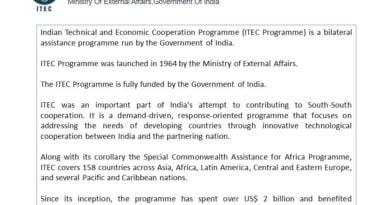The Farmers Producers Organization
Ministry of Agriculture & Farmers Welfare
Context:
Ministry of Agriculture & Farmers Welfare celebrates the first anniversary of the Central Sector Scheme on “Formation & Promotion of 10,000 Farmer Producer Organizations (FPOs)”
What is an FPO?
- Farmers’ Producer Organisation (FPO), also known as farmers’ producer company (FPC), is an entity formed by primary producers.
- These include farmers, milk producers, fishermen, weavers, rural artisans, and craftsmen.
- An FPO can be a Producer Company, a Cooperative Society or any other legal form.
- FPOs are basically the hybrids of cooperatives and private companies.
- The participation, organisation and membership pattern of these companies are more or less similar to the cooperatives.
- But their day-to-day functioning and business models resemble those of the professionally-run private companies.
- The Companies Act was amended by incorporating Section-IX A in it to allow creation and registration of FPOs under it.
Why are FPOs significant?
- FPOs play a significant role in enhancing the earnings of their member-farmers.
- Small producers do not have the large marketable surplus individually to get the benefit of economies of scale.
- So the main aim of an FPO is to ensure better income for the producers through an organization of their own.
- It provides for sharing of profits/benefits among the members.
- FPOs count has increased from less than 200 in 2010 to over 4,000 at present, speaking for the success of this agri-business model.
- As professionally-managed enterprises, working on behalf of the farmers, FPOs enjoy better bargaining power.
- They hence procure inputs and services and sell the farmers’ output at best prices possible.
- They are also better equipped to facilitate value-addition of the farm produce.
- So they ensure higher returns in almost all fields of agriculture and its allied activities – horticulture, plantations, dairy, poultry, fisheries, etc.
- Even the landless, tribals and those subsisting on collections from the wilds have gained by forming such organisations.
- Union Budget 2018-19 made announcements on a five-year tax holiday and setting up of a small credit guarantee fund of Rs 100 crore as pro-FPO measures.
ACTIVITIES UNDERTAKEN BY FPO’s
(i) Supply quality production inputs like seed, fertilizer, pesticides and such other inputs at reasonably lower wholesale rates.
(ii) Make available need based production and post-production machinery and equipment like cultivator, tiller, sprinkler set etc.
(iii) Make available value addition like cleaning, assaying, sorting, grading, packing etc. at user charge basis on reasonably cheaper rate.
(iv) Undertake higher income generating activities like seed production, bee keeping, mushroom cultivation etc.
(v) Undertake aggregation of smaller lots of farmer-members’ produce; add value to make them more marketable.
(vi) Facilitate market information about the produce for judicious decision in production and marketing.
(vii) Facilitate logistics services such as storage, transportation, loading/un-loading etc. on shared cost basis.
(viii) Market the aggregated produce with better negotiation strength to the buyers and offering better and remunerative prices.
Implementing Agencies to form and promote FPOs, namely
- Small Farmers Agri-business Consortium (SFAC)
- National Cooperative Development Corporation (NCDC)
- National Bank for Agriculture and Rural Development (NABARD).
BENEFITS
- Farmers as members of the FPO will have better bargaining power to leveraged trading at competitive prices.
- Aggregation of agricultural produce for better marketing opportunities.
Trading in bulk saves farmers on associated expenditures like processing, storage, transportation etc.
- FPOs may take up activities for value addition which fetch a higher price for the farmers’ produce.
- FPO formation facilitates utilization of pre and post harvest infrastructure like green houses, mechanized farming, etc.
- FPO can expand its business activities by opening of input stores, custom centres etc.
APPROACH
- FPOs are playing significant role in fulfilling the mission of implementing agricultural reforms in the country.
- Promotion & Formation of FPOs is the first step for converting Krishi into Atmanirbhar Krishi.
- For this purpose new Central Sector Scheme for Formation & Promotion of new 10,000 FPOs was launched.
A National Level Project Management Advisory and Fund Sanctioning Committee (N-PMAFSC) had allocated 2200 FPO clusters for 2020-21 to all Implementing agencies.
- Implementing Agencies had also identified the block wise clusters.
- FPOs will be developed by specialist ‘Cluster Based Business Organizations (CBBOs)’ engaged by Implementing Agencies.
FUNDING
- It is a Central Sector Scheme to form and promote 10,000 new FPOs.
It has been alloted a total budgetary provision of Rs 4,496 crore for five years (2019-20 to 2023-24).
- A further committed liability of Rs 2,369 crore for the period from 2024-25 to 2027-28 towards handholding of each FPO for five years .
- Recognizing the strength of POs, NABARD created a dedicated fund “Producers, Organization Development Fund (PODF)”.
What are the concerns?
- Many of the critical woes of this sector still remain unaddressed, including –
- Difficulties in securing institutional finance
- Inability to operate in the regular agricultural markets
- Lack of legal recognition under the contract farming regulations
- The banks are usually wary of granting loans to the FPOs as they do not have assets of their own to serve as collaterals.
- Consequently, the FPOs have to rely on loans from non-banking financial companies or micro-finance companies.
- They are forced to raise their working capital at very high interest rates.
- Even the facility of cheap bank loans with liberal interest subvention by the government that is available to individual farmers is denied to the FPOs.
- Moreover, many other concessions, tax exemptions, subsidies and benefits provided to cooperatives, startups and the like have not been extended to the FPOs.
- They also usually face difficulties in operating at the regulated mandis because of the resistance offered by the licensed traders.
- It’s because these traders have significant hold over the markets.
- All these issues need to be addressed expeditiously to enable the FPOs to perform to their full potential for the benefit of the farmers.



